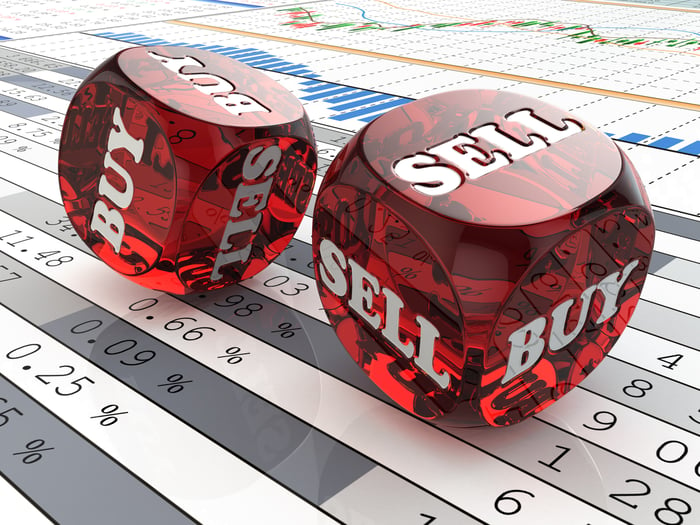|
|
|

|
|||||

|
|
By one estimate, quantum computing can create up to $1 trillion in global economic value by 2035.
The real-world utility of quantum computing solutions, coupled with a handful of early collaborations, have investors excited about the future.
However, the executives, directors, and beneficial owners of IonQ, Rigetti Computing, D-Wave Quantum, and Quantum Computing, Inc., are sending all the wrong signals.
Earlier this week, Wall Street celebrated the three-year anniversary of the start of the current bull market for the benchmark S&P 500. While the evolution of artificial intelligence (AI) has played a key role in sending the broader market to new heights, AI isn't the only game-changing trend fueling investor optimism at the moment.
Wall Street and everyday investors are extremely excited about the prospects of quantum computing, which is evident in the trailing-12-month (TTM) returns for four popular pure-plays:
Where to invest $1,000 right now? Our analyst team just revealed what they believe are the 10 best stocks to buy right now. Continue »
While this technology is delivering life-changing returns to investors in a short time frame, these four quantum computing stocks are also delivering a clear and unmistakable warning to Wall Street.

Image source: Getty Images.
Without getting overly technical, quantum computing relies on quantum mechanics and specialized computers to solve complex problems that traditional computers wouldn't be able to do (at least in our lifetime).
Much like the internet revolutionized business-to-business and business-to-consumer commerce, investors are looking to quantum computing as a technology that can usher in the next leap forward for a variety of industries. For instance, molecular interaction simulations run on quantum computers can rapidly narrow down the best course of action for drug developers when attempting to tackle hard-to-treat and deadly diseases.
Quantum computers can also be used to break existing AI- and machine learning-powered cybersecurity platforms to make them even safer. To build on this point, this technology has the potential to speed up the learning process of AI algorithms, which can enhance the efficiency and adoption of AI-empowered software.
Aside from this snippet of real-world utility, Wall Street and investors are intrigued by the growing addressable opportunity for quantum computing. Whereas Boston Consulting Group sees it adding $450 billion to $850 billion in global economic value come 2040, online publication The Quantum Insider believes $1 trillion in worldwide economic value can be created by 2035.
A handful of quantum computing pure-plays are working with some of Wall Street's most-influential businesses, as well. Quantum computers from IonQ and Rigetti Computing are both accessible using Amazon's quantum computing service, Braket.
With momentum on their side, IonQ, Rigetti, D-Wave, and Quantum Computing, Inc. have seen their shares skyrocket. However, things may not be as perfect as their respective returns suggest.

Image source: Getty Images.
While earnings reports, management commentary, and investor presentations are at the top of the list for investors when learning about a company's prospects, insider trading activity can also be incredibly important.
An "insider" is a high-ranking executive, someone on the company's board, or a beneficial owner who holds at least 10% of outstanding shares. In short, these are folks who may possess non-public information and should know their company better than any Wall Street analyst or retail investor.
Insiders of publicly traded companies are required to file Form 4 with the Securities and Exchange Commission no later than two business days after making a trade. This includes when they're buying shares of their own company, selling stock, or even exercising options. Full disclosure is a requirement for insiders of publicly traded businesses.
A quick roundup of insider activity over the trailing-five-year period (or as long as they've been public) reveals a cautionary tale for investors of Wall Street's quantum computing darlings:
Collectively, insiders at these four quantum computing pure-plays have sold a net of $875 million of their company's respective shares over the last five years.
Before diving deeper, let me introduce a bit of an asterisk into the above data. Compensation for executives and/or directors at publicly traded companies often comes in the form of common stock and options. To satisfy the federal and/or state-level tax liability for this compensation, executives and directors commonly sell stock.
Insider selling isn't necessarily damning to a company. Selling stock for tax purposes, or to diversify an investment portfolio, isn't something that investors should worry about too much.
On the other hand, there's only one reason for insiders to buy shares: they believe their stock will increase in value. All four quantum computing pure-plays have seen minimal or nonexistent insider buying. Quantum Computing, Inc. has seen zero insider purchases, while the last insider purchase at D-Wave Quantum occurred more than three years ago! If insiders aren't putting their money to work in their own stock, why should investors?
This lack of insider buying, when pared against persistent selling activity, makes the red flag surrounding quantum computing stock valuations shine even brighter.
While it's not uncommon for stocks on the cutting-edge of a next-big-thing trend to trade at a premium valuation, the TTM price-to-sales (P/S) ratios for quantum computing stocks are off the charts and historically unsustainable. Whereas no megacap stock leading an innovative trend has ever been able to sustain a TTM P/S ratio of 30 or higher, IonQ, Rigetti Computing, D-Wave Quantum, and Quantum Computing, Inc. are sporting respective TTM P/S ratios of 340, 1,796, 494, and 10,250!
Chalk up this collective $875 million in net-selling activity as yet another warning to Wall Street that this parabolic run-up in quantum computing stocks is unsustainable.
Before you buy stock in IonQ, consider this:
The Motley Fool Stock Advisor analyst team just identified what they believe are the 10 best stocks for investors to buy now… and IonQ wasn’t one of them. The 10 stocks that made the cut could produce monster returns in the coming years.
Consider when Netflix made this list on December 17, 2004... if you invested $1,000 at the time of our recommendation, you’d have $648,924!* Or when Nvidia made this list on April 15, 2005... if you invested $1,000 at the time of our recommendation, you’d have $1,102,333!*
Now, it’s worth noting Stock Advisor’s total average return is 1,052% — a market-crushing outperformance compared to 190% for the S&P 500. Don’t miss out on the latest top 10 list, available when you join Stock Advisor.
*Stock Advisor returns as of October 13, 2025
Sean Williams has positions in Amazon. The Motley Fool has positions in and recommends Amazon. The Motley Fool has a disclosure policy.
| 1 hour |
Quantum Computing Stocks: Infleqtion Pops In First Day As Public Company
QBTS RGTI IONQ
Investor's Business Daily
|
| 3 hours | |
| 6 hours | |
| 6 hours | |
| 7 hours | |
| Feb-16 | |
| Feb-15 | |
| Feb-14 | |
| Feb-14 | |
| Feb-14 | |
| Feb-14 | |
| Feb-13 | |
| Feb-13 | |
| Feb-13 | |
| Feb-12 |
Join thousands of traders who make more informed decisions with our premium features. Real-time quotes, advanced visualizations, backtesting, and much more.
Learn more about FINVIZ*Elite